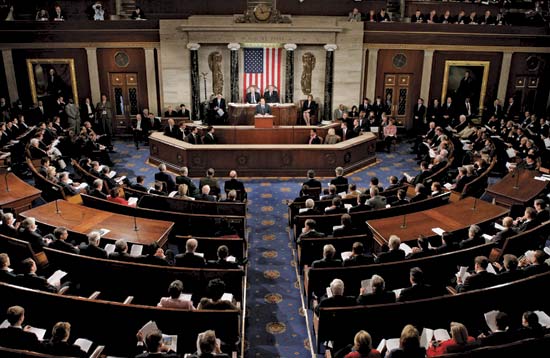Before you dismiss me as having lost my mind, let me take you back to the debate over the ratification of our Constitution over this very question. During the Constitutional Convention in 1787 there was much debate over how many representatives were to compose the House of Representatives. The final compromise was for each state to have no less than one representative and that there would be a limit of no more than one representative for every 30,000 citizens (which was a reduction in the original ceiling of 40,000 that had been proposed). As a result, for a population of around three million the first House of Representatives was set at sixty-five (interestingly, James Madison had argued for double that number).
In the ensuing debate in the papers during the ratification process those who opposed the Constitution as it was written repeatedly argued that this ratio allowed for too few representatives. Patrick Henry in his speech on June 7, 1788 during the Virginia Ratification Convention argued that the style of the language in Article I Section 2 was too vague and would be subject to future manipulation. The Anti-Federalist Robert Yates, a delegate from New York who used the pseudonym “Brutus”, wrote a scathing essay (Essay # IV, November 29, 1787) on this matter:
“The small number which is to compose this legislature, will not only expose it to the danger of that kind of corruption, and undue influence, which will arise from the gift of places of honour and emolument, or the more direct one of bribery, but it will also subject it to another kind of influence no less fatal to the liberties of the people, though it be not so flagrantly repugnant to the principles of rectitude…A farther objection against the feebleness of the representation is, that it will not possess the confidence of the people.”
The number was increased as the population of the country grew until The Permanent Apportionment Act was signed into law on June 18, 1929 which set the number at our current level of 435, based upon the 1910 census. Those who opposed this Act argued it was unconstitutional, but the law stood, and the current method of reapportionment was adopted in 1941. Obviously the objection of Patrick Henry over the vagueness of the wording in the Constitution proved to be true.
In Federalist #56, James Madison took on this argument of too few representatives, and in it made this observation: “It is a sound and important principle that the representative ought to be acquainted with the interests and circumstances of his constituents.” So the question is, given our population today and the number of representatives allotted, can this principle hold true?
We now have a ratio of approximately 700,00 citizens for each representative. Consider the fact also that according to many recent reports as much as two-thirds of a representative’s day is devoted to fund-raising for his/her party as well as his/her own re-election efforts. Given also the amount of time spent away from their districts and the sheer number of constituents, how can they possibly fulfill Madison’s dictum? The answer is, they can’t, despite the best efforts of some to do so; it just isn’t humanly possible.
This is part of the reason it is also hard for a challenger to defeat a well-entrenched, well-funded incumbent. I know from personal experience as I tried to do so twice, in the 2012 and 2014 GOP primaries. In my case I had to cover two and a half counties while holding down a full-time job and relying on a small group of loyal un-paid volunteers who also had full-time jobs. In such instances, reaching 700,000 people requires more time and money than an average citizen can muster, and so it is that those elected tend to be individuals who are well-connected or who have worked their way up the political ladder, building their name recognition and “war chest” of funds along the way. Such was not the intention of our founders in their vision of what the House of Representatives would be.
By increasing the number of representatives you reduce this ratio, making it more likely that citizen-statesmen could arise and be more ” acquainted with the interests and circumstances of his constituents.” As for The argument that too many would make it difficult to pass legislation, etc, I say “Good”! We have too many laws encroaching upon our freedom and liberties that exceed the constitutional boundaries of the general government anyway. Admittedly, too many representatives would make the Congress unwieldy. What that number ought to be I do not know, but it should be more than one for every 700,000 citizens.
-October 7, 2016
